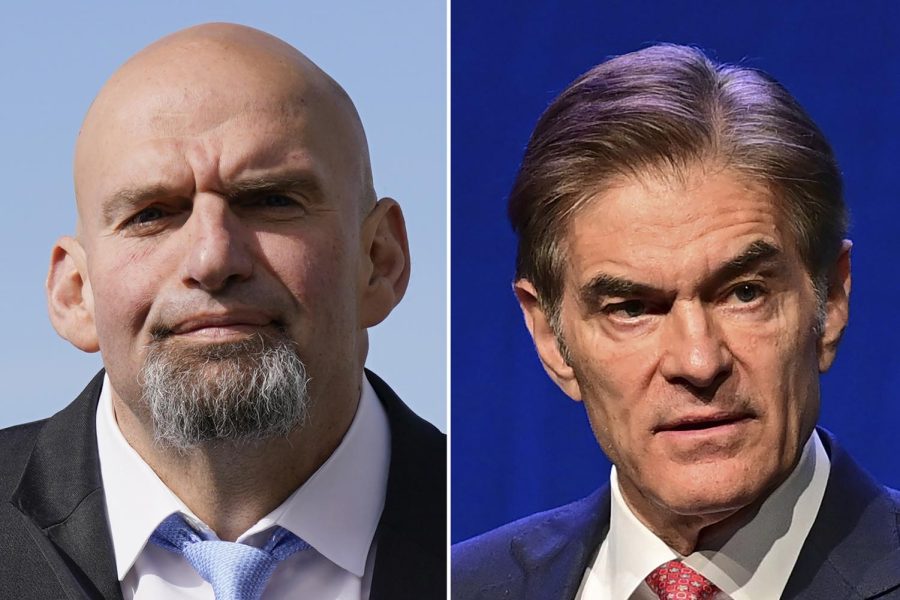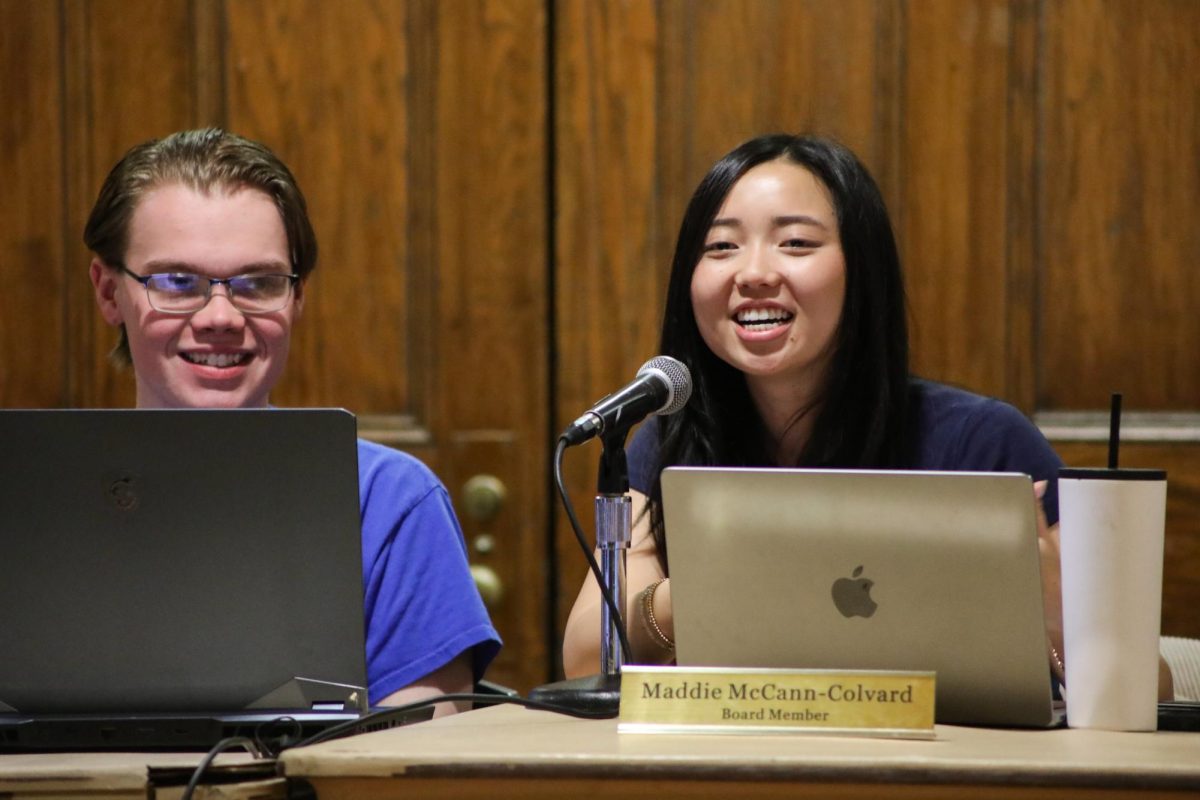Personal attacks, Tinder references and fracking: Pitt students react to Fetterman-Oz debate
Democratic Senate candidate, Pennsylvania Lt. Gov. John Fetterman, left, and Republican Senate candidate Dr. Mehmet Oz, right.
October 26, 2022
Pennsylvania Lt. Gov. John Fetterman and Dr. Mehmet Oz faced off in a debate Tuesday night for the first and only time in the race for Pennsylvania’s open Senate seat currently held by Sen. Pat Toomey.
Pitt students had mixed feelings about the candidates’ performances. While some think Fetterman’s recent stroke and subsequent health issues deem him unfit for office, others believe him continuing to campaign despite these challenges shows dedication and bravery. Even though more students agreed with Fetterman’s policies, some thought Oz had compelling answers.
Fetterman, a Democrat, is facing off against Oz, a Republican, in the Nov. 8 election. The debate featured discussion on issues such as fracking, abortion, education, inflation and more, with many personal attacks between the candidates.
Sam Meyers, a senior linguistics major, said neither candidate performed “particularly well” during the debate, but felt Oz performed better than his opponent.
“I feel like John Fetterman used far too many ad-hominem arguments as well as using the same points over and over again,” Meyers said. “Everything he said went back to the unions, whereas Dr. Oz had a more varied approach to different issues.”
Dylan Mitchell, a sophomore law, criminal justice and society and politics and philosophy major and a member of Pitt’s College Republicans, said personal attacks and misleading campaign ads have “bogged down” this election, and said both candidates spent too much time during the debate focusing on personal attacks and not enough time on the specifics of their policy proposals.
“Oz made strong points about Fetterman’s radical stances on crime, the consequences of his federal $15 minimum wage proposal on small business owners and his contradictory energy policy,” Mitchell said. “Fetterman, on the other hand, seemed on the defense throughout the night, unable to come up with a good answer for his history of unpaid taxes, his long-term solutions for inflation, solutions to fentanyl coming over the border, or any unpopular Biden spending policy that he would have voted against.”
Meyers said he thought Fetterman had better ideas about inflation, especially his thoughts on price gouging. He said he “loved” the Tinder reference Fetterman used in his response when he said, “Dr. Oz swipes right on oil companies.”
“Dr. Oz, much like with a lot of the issues, was beating around the bush, not really getting to the point and being way too bureaucratic with his answers,” Meyers said. “I feel like that hurt his case.”
Fracking was a point of concern for many students, especially when moderators confronted Fetterman on two of his own conflicting statements on the issue. Parker Jacoby, a sophomore psychology and political science major, said Oz performed stronger in the area of fracking because Fetterman changed his stance in comparison to 2018 when he publicly spoke against it.
As recently as 2018, Fetterman said he doesn’t support fracking and, at the debate, he misleadingly said he has always supported fracking.
“I don’t trust politicians who constantly flip-flop on issues, especially only a few years apart,” Jacoby said.
Meyers agreed with Jacoby that Oz presented a stronger stance on fracking, and said Fetterman’s support caught him completely off-guard. He said he thought Fetterman could have had a “mind-slip” — possibly mistating his own opinion — or made an attempt to “stay true” to his supporters who are in favor of fracking.
“Since a lot of those voters tend to lean Republican, that might have been his reach into the middle,” Meyers said.
Saira Salyani, a senior political science and communications major and the vice president of Pitt’s College Democrats, said she felt disappointed and concerned to see that both candidates had strong opinions in favor of fracking. She said she understands fracking is a large part of Pennsylvania’s economy right now, but said a “more ambitious” candidate wouldn’t see that as an obstacle.
“At this point, we are dealing with an environmental crisis and we’ve seen what the effects of climate change are,” Salyani said. “We know that we could be focusing our energy on different alternative energy sources, but instead we are being kept in the past by fossil fuels and fracking.”
Devin Jiang, a sophomore political science and law, criminal justice and society major and the volunteer coordinator for College Democrats, said Fetterman focused too much on rhetoric throughout the debate, while Oz focused on substance and policy issues. He said Oz “won the debate” on fracking because he related it to other issues such as energy independence, foreign policy in Iran and jobs.
“I think those issues catered not only to his platform, but also to what voters are thinking about, especially when it comes to the economy,” Jiang said.
Michael Scotto, a junior political science major, said neither candidate proposed any strong policies throughout the debate, but said Oz diminished his credibility as a doctor.
“I believe Oz is kind of a phony who leaned very heavily into his career as a medical doctor despite that there are numerous campaigns from still-practicing doctors that do not support him or his campaign,” Scotto said.
Jiang agreed with Scotto and said Oz also “tarnished” his reputation as a doctor tonight on the issue of abortion.
“Every well-reasoned and well-educated doctor knows that abortion is an issue between a patient and their doctor, and Dr. Oz definitely did not say that,” Jiang said. “He said it’s between those two, but also state officials.”
Salyani said she thought Fetterman showed bravery for participating in the debate despite his recent stroke, and thought that he had better stances on various issues in comparison to Oz.
“The fate of the country is in the hands of this Senate race and we’ve seen how extreme Oz’s viewpoints on various things are,” Salyani said.
Salyani expressed concerns over how voters will perceive Fetterman’s auditory processing issues and believes that a lot of people will call attention to Fetterman’s health problems. Salyani said despite her concerns about the voters’ perceptions, she doesn’t believe they will interfere with his ability to be a senator.
“There were times when he was searching for words and there were times when there were pauses, but I think he can still think critically,” Salyani said. “He still knows what he believes in and he still is really dedicated to helping people and serving the public.”
Jacoby said he agrees with Fetterman on most issues and does not think Oz has any substantial positions to help Pennsylvania students and families, or to fix the economy.
“Dr. Oz is a phony who kept flipping his positions back and forth to try to win over Republicans and independents,” Jacoby said. “He came across as someone who was on TV for twenty years and a fake doctor, as he’s been slandered as by Fetterman.”
Mitchell, who was undecided prior to the debate, said Oz’s performance earned him his vote.
“Fetterman, largely as a result of his stroke, definitely seemed very weak and confused, and his performance in the debate and refusal to release his medical records raises a serious question about his ability to negotiate and represent the commonwealth in the senate,” Mitchell said.



